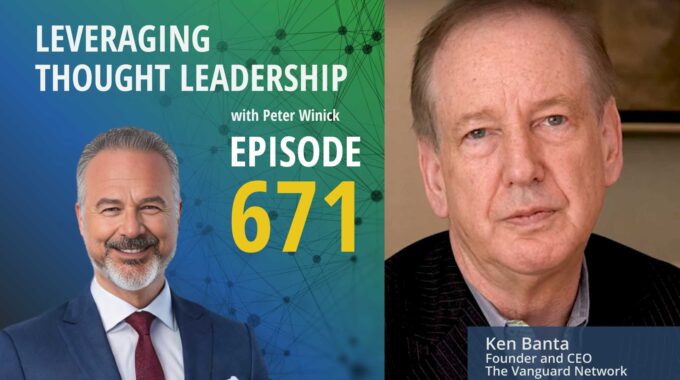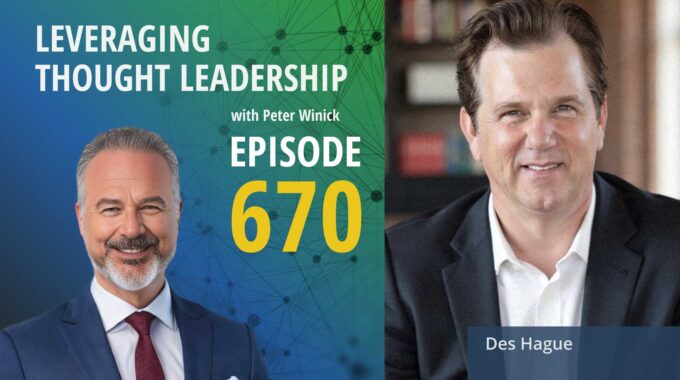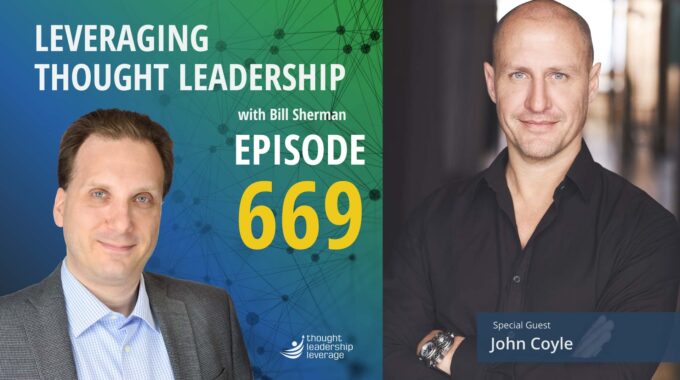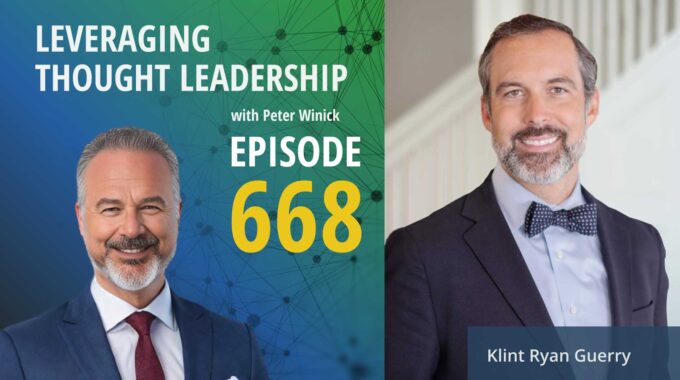Turning Conversations into Influence This episode highlights how peer-to-peer networks drive candid dialogue, spark fresh…
Leveraging Thought Leadership With Peter Winick | Steve Blank | 206
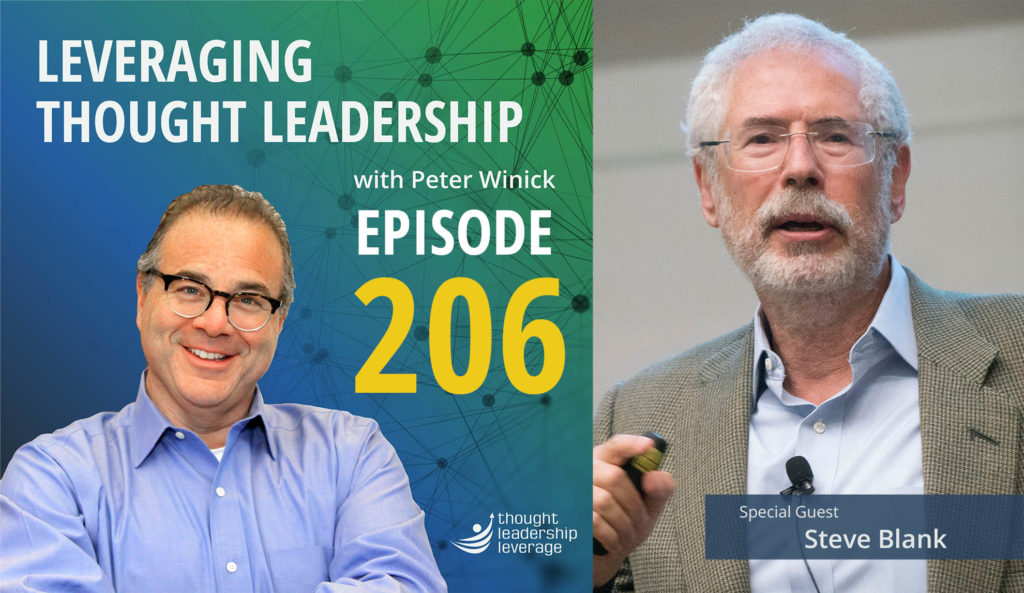
If you are starting a content-based business, you’ll need to keep things lean and focused. Are you sure your strategies around content, audience, and marketing are correct? You’ve got a passion for content, but have you done the research necessary to achieve success?
Our guest in this episode is Steve Blank, father of modern entrepreneurship and credited with beginning the “lean startup” movement. He is also the author of The Four Steps to the Epiphany and The Startup Owner’s Manual.
Today, we discuss the need to be specific about the problems you solve and the successes that will happen as a result. Steve explains why he gives some of his best ideas away for free, and how that will attract more paying clients. We dive deep into content creation, the questions you need to ask, and talk about how we all stand on the shoulders of others. Steve’s work is incredible, and his insights are, too!
Why are you writing a book? Have you thought through all the reasons, and formulated a strategy for success? Here’s a short video from Peter, helping you think through your Reasons to Write a Book
Transcript
Peter Winick And welcome, welcome, this is Peter Winick. I’m the founder and CEO of Thought Leadership Leverage. And you’re joining us on the podcast today which is Leveraging Thought Leadership. Today my guest is Steve Blank. Steve is an entrepreneur turned educator. He is the father of modern entrepreneurship. He’s credited with launching the Lean Startup Movement. He’s changed how startups are built, how entrepreneurship is taught, and how science is commercialized. He’s the author of The Four Steps to the Epiphany, The Startup Owner’s Manual, and his cover article in the May 2013 Harvard Business Review defined really the Belin started movement. He teaches at Stanford, Berkeley, and NYU. and obviously has a blog, speaks, has written a bunch of books. Welcome aboard, Steve. How are you?
Steve Blank Thanks for having me.
Peter Winick My pleasure. So it is an honor to have you on here today. You have been at this content creation and thought leadership space for quite some time. So tell us a little bit, because I know your blog is quite well known. How it all plays together, how the blog connects to your books, connects to your speaking and your articles and sort of the whole ecosystem of your thought leadership, if you could.
Steve Blank Yeah, so I think I had somewhat of a unique experience. At first, the blog started not to sell a book or consulting, but I had some ideas. I wanted to get out to a wider audience. And so I decided to share a couple of ideas and stories. tell my kids what their father actually did before they saw him sitting at home eating chocolates thinking he never had worked a day in his life. So I used it for multiple ideas, as I said, getting out the lean startup story. I started teaching some unique classes. I wanted to share that with other educators and wanted to share some interesting history of Silicon Valley. At the time, the blog was probably the perfect vehicle to do that.
Peter Winick So yeah, that was my next question. When did you start the blog?
Steve Blank I think it’s probably about 10 years old now. So relatively early on when it was before people were using Twitter or Instagram or other parts of social media, as those emerged, I now use those to kind of repost my material. But my blog looks like it was written in the 18th century in terms of formatting.
Peter Winick I was going to say, if Ben Franklin had a blog, it might look similar to yours in terms of the format, so that’s a good thing.
Steve Blank Yeah.
Peter Winick Well, but you said you’ve now integrated. So what’s interesting is the blog was sort of your flag in the ground. And some of that is a function of your preferences and style. And some it was termed in terms of what was the optimal modality at the time. Tell me at what point you started to say, OK, so the blog is good. And it gives me the traction and a place to have my voice. But now I have to tap into Twitter and LinkedIn, it’s et cetera, amplify and create the movement. Tell me a little bit about that, if you could.
Steve Blank So now I repost on LinkedIn. I repose on Medium. I have a personal page on Facebook. everything I post on my blog gets reposted there. It gets tweeted as well. So it’s kind of a multi-channel social media. Again, I would say not very professional, but kind of professional in the sense that I’m using all the channels I can. And at the same time, we’re reposting some of these articles and trying to see. If there’s interest in the first as a hierarchy, Harvard Business Review, if it’s about corporations, Inc. or entrepreneurs, if its about startups, War on the Rocks and other places, if It’s about defense, I think I’m probably the only guy who’s ever had an article simultaneously posted on my blog, Harvard Business review, and in Peking in the People’s Daily on the same week.
Peter Winick That’s an interesting hat trick. You know, you mentioned a lot about the blogs and articles, and I want to just push on that for a little bit. So to me, there’s different modalities, and then there’s distribution channels that are different. So when you’re taking a piece of content that you wrote for a blog and then, you know, putting a bit.ly or whatever in Twitter, you’re taking advantage of the modality. I didn’t hear you say a lot about various modalities in terms of short form video or infographics. Are those part of your repertoire, your toolbox?
Steve Blank Well, the other thing I did is we put a good number of my lectures online. When Udacity was a startup, I had, I think, the second course on there. And there’s now a half a million people who’ve taken my video lectures. OK. So we’ve done that. And then I’ve done videos on something called the Business Model Canvas and the Mission Model Canvas. And so if you go to my webpage, there’s a tab actually called Startup Tools and Videos, and there are, you know, must be a hundred videos and links to teaching material and everything else. So the blog itself is more than just the blog, it’s attached to a webpage with a set of open source resources for educators, people who are interested in innovation. And again, I had the advantage of… not wanting to sell anything other than an idea. So that’s really different from people who want to sell a product or a service, though I have to tell you if I was trying to sell product or service I would probably do almost exactly the same thing, is that people tend not to want to give away their best ideas. I’ve kind of figured out if you actually give away your best ideas that attracts people and will force you to come up with better ideas. If all you’re doing is selling the same idea after the last five years, you’re getting stale.
Peter Winick So let’s stay there for a minute because I think there’s two schools of thought there where one is give it all away and I’m smart and if you like what I have to say, you’ll want to hire me if that’s what you’re doing, right? Irregardless. And then there’s the other one that says, well, I’ll give you yesterday’s news there. And I tend to agree with you that if you really want the world to see the best representation of your thinking, why would you give them anything less than your best? right? You know, the group that’s going to take it and do it on their own never would have been a client, right? And I just, I don’t understand the logic underneath not giving your best away.
Steve Blank Well, because you might not have any more. Um, and so I, uh, you know, I, I don’t want to, you know, the world isn’t made up of like, everybody is over exceptional. And then there’s no one else. And I don’ mean like some clients don’t need McKinsey or, or whatever. They just need blocking and tackling. If those are the services you could offer, then those are the service you could. There’s a difference between if you want to be a thought leader. And I’m not sure I’d put myself in that category, but I do have new thoughts that I share. And I kind of go, let’s share them as soon as they kind of come out and see what happens. If you’re selling kind of a service that’s kind of an execution service, then that’s a different type of strategy. So you have to decide what it is you want to stand for and be known for.
Peter Winick So, but you said early on that you’re not selling anything. I mean, you’re selling an idea, but if all of a sudden you were in the role of advising someone like you, except they wanted to traditionally sell it. They wanted to monetize the content through tools, consulting services, the usual array of options. What would you advise them to do this the same as what you’re doing and what might be different?
Steve Blank Well, I would, in fact, instead of, you know, I kind of talk about high level ideas and whatever, but you know if you’re doing consulting, people have problems they want to have solved. So number one is I would be talking about their problems rather than you, you know, and talking about here are the things we’ve solved for other people or here are the tools we’ve built to solve these kinds of things and every article should probably end with. And if you have a problem that sounds like that, you know, we’re the experts at solving them. Contact us here.
Peter Winick So it would be less methodology or framework specific and more from the problem backwards.
Steve Blank Yeah, you know, in terms of the narrative, you know, it’s a difference between proselytizing a religion and proselytizing the life you could get if you follow the religion. Right? So, so one could tell you all about the details of the religion, but if I don’t understand that I’m going to have 29 virgins in heaven, I might not be interested. Right. But if you could explain to me the outcome or and what you saw for me, you know, I could live a better life than company will be more productive or I could drop more money to the bottom line, gee, now I think you understand the problem I have and I might want to engage with you and understand what your secret sauce is. And as I said, it might not even be a secret sauce, it just might be, you’ve seen the movie so many times, you’re actually good at solving the top 80% of the problems that most organizations have in the domain you’re interested in working in.
Peter Winick So what else would you do differently then, or more of, again, if you were selling it versus giving it away? So I like the problem focus. Anything else you might do differently? Case studies. Case studies, okay. Case studies Got it.
Steve Blank So I tend to write in, you know, Bob was I kind of write in euphemisms of Bob and Sally were sitting at the table and come to me for advice. Because I kind kind of like hide the who it is and whatever. Yeah, sure. I would be very specific about solving specific problems. And more importantly, the results that happened after you did. Such that people reading that kind of go wow this is a person who not only comes in understand their problem comes up with a solution but it’s actually interested in an outcome that’s aligned with my needs who’s ever hiring you and the needs of the company who’s paying
Peter Winick No, good stuff. If you’re enjoying this episode of Leveraging Thought Leadership, please make sure to subscribe. If you’d like to help spread the word about our podcast, please leave us a review and share it with your friends. We’re available on Apple Podcasts and on all major listening apps, as well as at thoughtleadershipleverage.com forward slash podcasts. I wanna go down a little bit of a different path for Mo if we could. So I think I would be remiss if I had sort of the father of the lean startup movement. on the line and didn’t ask about how to apply the principles of lean. In a content based business so the people that are listening to people that i work with our author speakers thought leaders consultants etc that are looking to scale leverage and monetize the content right because it doesn’t scale if you’re you’re the author you have a book in the only product is your book your keynote so how would you apply some lean startup principles to a content-based practice that’s looking to turn into a business that’s a bit more scale.
Steve Blank Well, one of the things is when you start this content business, you have a set of hypotheses about customers, about needs, about audience, about messages, about messengers. It’s just back to blocking and tackling one-on-one. I would write down what all your hypotheses are. Who’s my customers? Who are the buyers? and who’s whatever. And then instead of creating a whole pile of stuff and you know all website or whatever the media strategy is i would actually go test this with some of your potential audience you know what do you listen to what do u read why do you read it you know which ones do read the most wires that like engaging how much time do you have.
Peter Winick So let’s push that down to a book, right? So I want to apply the principles because I know the lead startup principles work. So there’s two ways I’ve seen people, more than two, but for simplicity sake, I’ll get it down to two. People write a book. They get an idea, they study it, they research it, they do their interviews, they write the book and there’s some outcome. The other way is they’re more methodical and testing, so they’re gonna write a bunch of blogs and then this one bubbles up to the top and you go, ooh, that resonated. I’m gonna go deeper there and then something else bubbles up. So they’re using the internet and blogs and other formats, short form video, et cetera, as basically an R&D tool in service of writing the right book. How would you respond to that?
Steve Blank Well, it depends on what your mindset is. I mean, you could decide that you have a topic you’re passionate on. And by the way, that was mine. I really didn’t care whether anybody understood what customer discovery and what became lean was, because if I would have asked them, no one would have said they were interested because I was creating something that was disruptive. So you gotta be careful what you’re asking. I followed my passion and realized I was either very wrong or very right. so there’s no there’s one issue creating something disruptive and asking people what do they think in a new marketer new segment you’ll get to divide by zero answer that is no one knows what the hell you’re talking about first so follow your right. The other is you’re entering an existing market that when you’re going to either do a better version of with new content or service, or you’re gonna kind of do some new spin on an existing market, then you could do some interesting discovery. I just wanted a segment that, you know, you can’t focus group something that’s never existed before, or, you’ll get like, well, we don’t want it. Well, therefore nothing new would ever be created. So you gotta make sure you’re like. understanding what path they’re going down. You’re going to be okay if people say while you’re writing the book, I don’t get it. I don t need it. This is crazy. That’s what happened in the beginning with me, with Aline. Every business school professor I talked to said, look, Steve, we consult for companies with 100,000 people. You re doing this stuff for startups. How hard can six people in a garage be? They don t their own methodology. It turns out they were all wrong. Six people in the garage is very different than consulting for a large company. And the book I wrote was not like people were standing there saying, we can’t wait for this. But I saw something, they didn’t. So the question your audience needs to ask is if you’re writing a book or coming out with a new service is, do you think you see something that no one else does? Do you hear something that nobody else does, if so, you’re A, either a visionary, or B, you’re hallucinating. and only time will tell which one’s true, you’ve got to decide if you want to spend your time doing that.
Peter Winick Interesting. So there’s a time to be methodical and there’s a time just to say I’m just getting this out there and I don’t care. Like, I know.
Steve Blank Not only I know that I’m willing to spend my time and bet because I’m driven by passion here, not driven by math. And if you’re driven by maths, you know, you’re not going to be an artist, right? Most artists die broke.
Peter Winick But there’s a time and place for both, right? There’s a kind of place to say, screw it, I’m an artist and I’m gonna do what I’m going to do. And there’s other times to say this is actually the reason I’m writing this book. I have some business objectives. I want to grow this on, you know, yeah. And they have a different set of tactics underneath it.
Steve Blank You bet. That’s the point I’m trying to make is that you need to understand which one you’re doing at the time either you got a passion you want to get in writing and you don’t care what other people think or you’re running a business and You want to build the content and the strategy to match the business?
Peter Winick And neither are right or wrong. I mean, I, you know, in my work with clients, I’m always asking them, okay, so you want to write a book, why? What does success look like? What are you writing this book? And in some cases, it’s intrinsic. You know, one of the reasons they were put on the planet is to get this out there. That’s cool. In other reasons, you, you known, in other cases, it’s very, very deliberate of, I’m only going to make this investment of time, energy, effort, and money in pursuit of growing my current business. So how do I optimize it that way? You bet. A little more, a little more manufactured or a little bit more deliberate. But you can’t tell the artist to be deliberate, you can tell the deliberate person, oh, screw it, just, you know, do what your gut tells you. Like, it’s just bad information.
Steve Blank Now we got to probably the most valuable sum of what I’ve been saying and you as well is that you need to decide which of the two you’re doing on this particular project. Are you doing something for passion because you believe or are you doing for your existing business to grow it? they’re not the same thing.
Peter Winick Yeah, exactly. I think the worst is when it’s unknown at the start, because then you could sort of pinball back and forth between deliberate and passion. If you don’t spend that time up front getting clarity around, why am I taking this on? What am I trying to achieve? Who am I trying achieve it for? Is it for me, is it for others, et cetera? As we start to to wind down here a little bit. What are the thoughts, advice? do’s, don’ts, et cetera, you would have for someone that’s out there now, that’s maybe where you were 15, 20 years ago, they’ve got something to say, they wanna get it out there, like forget about the technical abuse Twitter instead of a blog, but just general overall sort of life advice for folks like that.
Steve Blank Well, one of the things I did when I started writing at least what was called the four steps of the epiphany that kind of kicked off the whole customer development process is I read almost every book that was adjacent or close in the corporate space even though I was writing about the startup world. And if you’re writing a book about a new tactic or strategy or something, my advice if you’re not convergent conversion with the literature around you. It’s really not going to be a very productive book for others. You ought to understand how your advice or concept is similar or different and how does it fit in and are you just reinventing someone else’s language or are you actually value adding on top or next to someone else and being able to provide that context for your readers is a big idea. So full stop. Don’t invent new language if language exists. Don’t event new models if someone else has come up with a business model canvas like Osterwalder. Don’t come up your own canvas if in fact what you really have is an idea on how to add on or simplify or do something else. Stand on other people’s shoulders rather than try to create a whole new platform. That would be like advice one and I see lots of people with great ideas thinking they have to reinvent all of it or people won’t respect them. I think it’s the other way around. Put yourself in contact.
Peter Winick Yeah, no, I love that because I mean, I see two versions of that. There’s the, you know, someone that just because the idea is new to them doesn’t mean it’s new and it’s basically a book of regurgitation. And you’re reading you’re like I’ve seen all that before. That person just didn’t do their homework. And then the other is somebody that is wise enough to stand on the shoulders of giants and take the conversation of a discipline to the next level or add something to the conversation, et cetera, because I guarantee you the world doesn’t need another book on X, unless it introduces some new thinking, a new perspective to the audience because people just don’t have the time for it.
Steve Blank That you nailed it exactly. And I get that down now to a sentence is, so tell me what your unique insight is that hasn’t been written about or talked about before. And by the way, sometimes a great source for this stuff is, you know, I’m always amused. Sometimes a great insight is, well, academics have had these papers, you know, out for 15 years, but they’re written in such, you know, obtuse academic language. I’m just translating it for practitioners.
Peter Winick Well, that’s just no different than taking a North American book and putting it out in Korean basically. It’s a translation exercise.
Steve Blank: And by the way that’s valid.
Peter Winick Yeah totally valid, Exactly. Well, this has been great, Steve. I appreciate your sharing with us your wisdom and your knowledge and your thoughts and your processes and methodologies and being clear to folks that they’re free to choose and pick what they want based on their situation and where they are. So thank you so much for joining us today, Steve, I appreciate it.
Steve Blank Great. And if your listeners want to go see my website, it’s at SteveBlank.com.
Peter Winick Cool, thank you.
Steve Blank All right.
Peter Winick To learn more about thought leadership leverage, please visit our website at ThoughtLeadershipLeverage.com. To reach me directly, feel free to email me at peter at Thought Leadership Leverage dot com and please subscribe to Leveraging Thought Leadership on iTunes or your favorite podcast app to get your weekly episode automatically.


